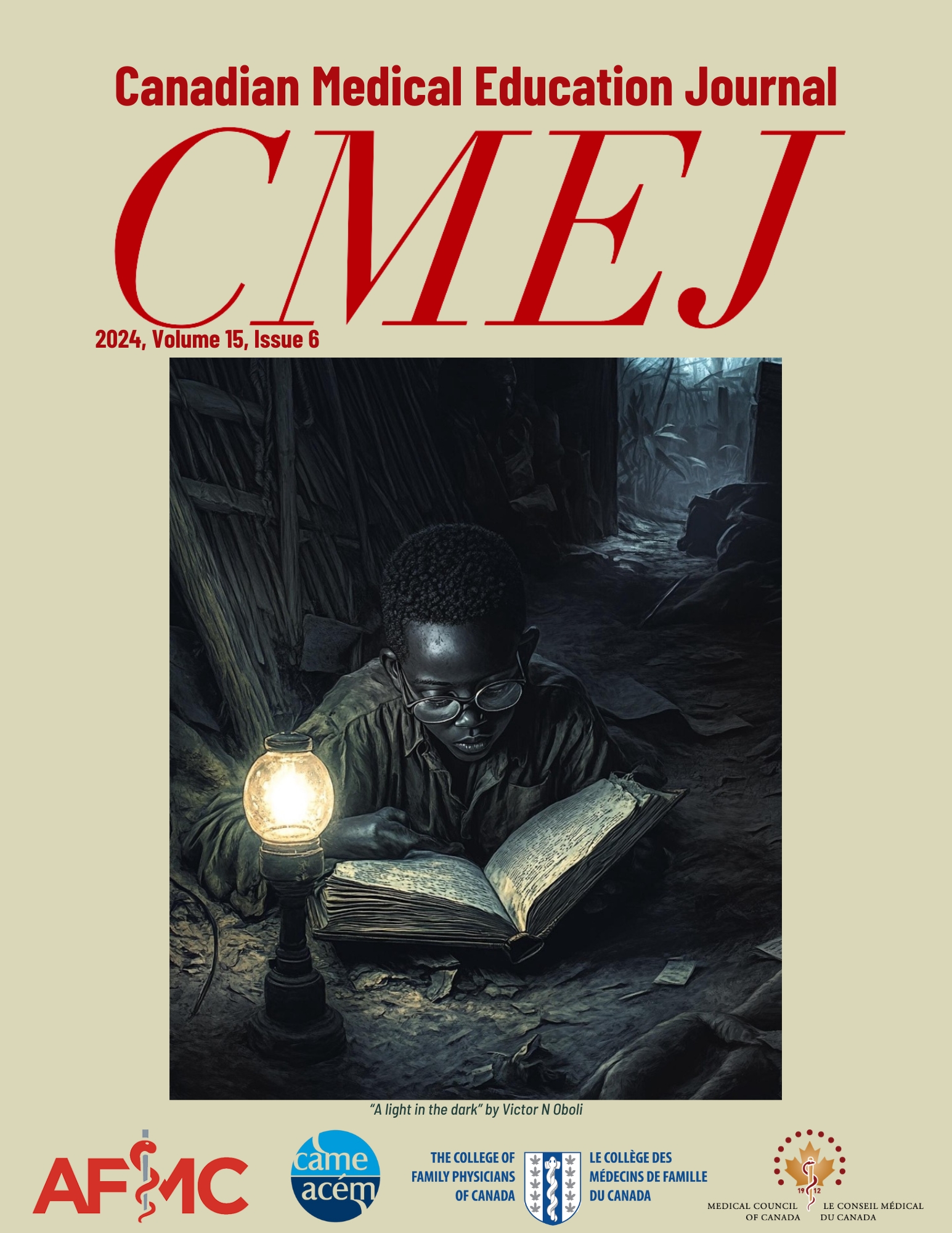The Psychiatry Information Card: a pocket resource to assist students’ transition into psychiatry clerkship
DOI:
https://doi.org/10.36834/cmej.79374Abstract
Implication Statement
The Psychiatry Information Card (PIC) offers a practical, structured concise resource to enhance medical students' confidence, knowledge, and self-reflection during psychiatry rotations. Its utility lies in providing targeted support for students navigating the transition from classroom learning to clinical practice, and addressing specific challenges encountered during this critical phase of medical education. By offering accessible and relevant information aligned with rotation objectives, the PIC increased knowledge pre and post rotation, and enhanced the learning experience. The PIC's acceptability is demonstrated by the high recommendation rate (90%) among participants, who endorsed its integration into the rotations. Additionally, the low cost and ease of distribution make the PIC a cost-effective resource, further supporting its feasibility for widespread implementation. Therefore, we recommend formal integration into the curriculum.
Downloads
References
Whipple ME, Barlow CB, Smith S, Goldstein EA. Early introduction of clinical skills improves medical student comfort at the start of third-year clerkships. Acad Med. 2006; 81 (10 Suppl): S40-43.https://doi.org/10.1097/00001888-200610001-00011 DOI: https://doi.org/10.1097/00001888-200610001-00011
Radcliffe C, Lester H. Perceived stress during undergraduate medical training: A qualitative study. Med Educ. 2003; 37(1): 32–38. https://doi.org/10.1046/j.1365-2923.2003.01405.x DOI: https://doi.org/10.1046/j.1365-2923.2003.01405.x
O’Brien B, Cooke M, Irby DM. Perceptions and attributions of third-year student struggles in clerkships: do students and clerkship directors agree? Acad Med. 2007; 82: 970-978. https://doi.org/10.1097/acm.0b013e31814a4fd5 DOI: https://doi.org/10.1097/ACM.0b013e31814a4fd5
Firth J. Levels and sources of stress in medical students. Br Med J (Clin Res Ed). 1986; 292(6529):1177–1180. https://doi.org/10.1136/bmj.292.6529.1177 DOI: https://doi.org/10.1136/bmj.292.6529.1177
Lajoie SP. Transitions and trajectories for studies of expertise. Educ Res. 200332(8): 21–25. https://doi.org/10.3102/0013189X032008021 DOI: https://doi.org/10.3102/0013189X032008021
Lave J, Wenger E. Situated Learning: Legitimate peripheral participation. Cambridge University Press; 1991. pp.140s. https://doi.org/10.1017/CBO9780511815355 DOI: https://doi.org/10.1017/CBO9780511815355
Downloads
Published
How to Cite
Issue
Section
License
Copyright (c) 2023 Hiba Rahman, Aarondeep Shokar, Mariam Alaverdashvili, Dawn De Souza

This work is licensed under a Creative Commons Attribution-NonCommercial-NoDerivatives 4.0 International License.
Submission of an original manuscript to the Canadian Medical Education Journal will be taken to mean that it represents original work not previously published, that it is not being considered elsewhere for publication. If accepted for publication, it will be published online and it will not be published elsewhere in the same form, for commercial purposes, in any language, without the consent of the publisher.
Authors who publish in the Canadian Medical Education Journal agree to release their articles under the Creative Commons Attribution-Noncommercial-No Derivative Works 4.0 Canada Licence. This licence allows anyone to copy and distribute the article for non-commercial purposes provided that appropriate attribution is given. For details of the rights an author grants users of their work, please see the licence summary and the full licence.










